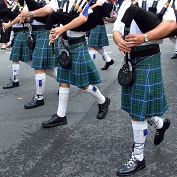What do dance partners, choirs, marching bands, reciting the pledge of allegiance and religious chanting have in common? They all suggest that synchronizing activities facilitate bonding and mutual support among the participants involved.
In a series of studies conducted at Stanford, researchers found that people walking in step with each other, or singing and waving cups in unison, reported greater feelings of connectedness and trust with their group - and earned higher pay-offs when playing a guessing game which involved second guessing the numbers picked by the other members of their group - than did the unsynchronized comparison groups. These and other studies suggest that participating in marching in bands, religious chanting, reciting the pledge of allegiance, singing in unison, and rock concert mosh pits facilitate bonding and mutual support among the participants. Synchronous activity seems to create bonds among the participants that facilitate cooperation and even mutual sacrifice. When acting in unison we are thinking collectively and not individually.
The implications for negotiation and mediation have yet to be tested, but may be promising. Negotiators and mediators mindful of the effects of synchrony may have much to gain through mimicry, or through encouraging joint activities that require synchronized physical movement.
Wiltermuth S. S. & Heath C. 2009. Synchrony and cooperation. Psychological Science, Vol. 20, Pp. 1- 5.
